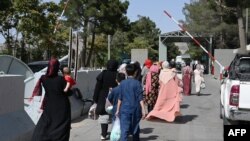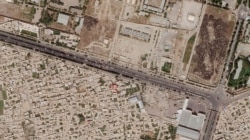A few hours after U.S. President Joe Biden said another attack on the Kabul airport is likely within the next 24 to 36 hours, the U.S. Embassy in Kabul, citing a specific and credible threat, urged U.S. citizens to leave the vicinity of the airport.
The security alert urged Americans to avoid the airport, and said those in the vicinity of the airport, including the South (Airport Circle) gate, the new Ministry of the Interior, and the gate near the Panjshir Petrol station on the northwest side of the airport, should leave immediately.
Biden warned of more likely attacks in a statement Saturday, as the U.S. and its allies wind down an evacuation of their citizens and Afghans fleeing the Taliban and just two days after a suicide bombing on the perimeter of Kabul’s airport, in which at least 170 Afghans and 13 U.S. service members were killed.
Biden said he directed U.S. commanders to protect American troops on the ground at the Hamid Karzai International Airport as the massive airlift comes to an end and U.S. troops withdraw.
The White House says about 2,900 people were evacuated from Kabul in a 12-hour period ending at 3am EDT Sunday. It says that since August 14, the U.S. has evacuated or helped evacuate more than 114,000 people.
About 2,000 people were evacuated from Kabul in a 12-hour period ending at 3 p.m. EDT Saturday, according to the White House. This included about 1,400 evacuees on U.S. military flights and 600 people on seven coalition flights.
The White House also said that since Aug. 14, the U.S. has evacuated or helped evacuate about 113,500 people. Since the end of July, the U.S. has relocated about 119,000 people.
Separately, the U.S. airstrike Friday night against an Islamic State Afghan affiliate group — retaliation for Thursday’s attack — resulted in the deaths of two important members of the group, the U.S. Defense Department said Saturday. The affiliate, Islamic State Khorasan, or ISIS-K, had claimed responsibility for the airport attack.
“Two high-profile ISIS targets were killed, and one was wounded, and we know of zero civilian casualties,” Pentagon spokesperson John Kirby said at a media briefing, using an alternative designation for the group.
“This strike was not the last,” Biden said. “We will continue to hunt down any person involved in that heinous attack and make them pay.”
Kirby would not discuss to what extent ISIS capabilities may have suffered as a result of the U.S. attack, saying instead, “They lost a planner, and they lost a facilitator, and they’ve got one wounded. And the fact that two of these individuals are no longer walking on the face of the Earth — that’s a good thing.”
Taliban spokesperson Zabihullah Mujahid reportedly denounced the U.S. airstrike, saying it was a “clear attack on Afghan territory,” according to Reuters. He also reportedly said the Taliban expects to take full control of the airport when U.S. forces complete their pullout from the country, scheduled for Tuesday.
Ongoing threats
Pentagon spokesperson Kirby said at Saturday’s briefing that threats against the airport “are still very real, they’re very dynamic, and we are monitoring them literally in real time. And, as I said yesterday, we are taking all the means necessary to make sure we remain focused on that threat stream and doing what we can for force protection.”
The security threats have made the evacuation of Americans and some Afghans more difficult.
“There doesn’t appear to be any concerted effort to get SIVs [Special Immigrant Visa holders] out at this point,” a State Department official told VOA from the airport. But the department is still trying to evacuate local embassy staff, U.S. citizens and legal permanent residents.
The U.S. evacuation of Afghans at the airport has wound down significantly, with most of the remaining 100 American civilian government staffers set to leave before midnight, according to a State Department official who spoke with VOA Saturday on the condition of anonymity.
The airport terminals are mostly empty, said the official, who expressed mixed feelings about the operation.
“I feel the frustration of the failure of the operation overall,” said the official, who described the decision-making process of getting Afghans evacuated as “chaotic” and “subjective.”
“But I'm extremely proud of the work of the guys on the ground, just the kind of bare-knuckled diplomacy of getting to know the Afghans, even though some of us didn't know the language,” the official said.
Britain, meanwhile, said Saturday it would halt flights to evacuate civilians and started bringing its troops and diplomats back to the country. Britain reported late Friday it had evacuated more than 14,500 Afghan and British nationals since the Taliban seized control of the country two weeks ago.
Britain ended the evacuations a day after Defense Secretary Ben Wallace announced “with deep regret” that Britain has stopped processing people for evacuation from Kabul, and he noted that many British citizens and Afghans who had worked with Britain in Afghanistan would not be able to leave.
France previously announced that it is ending its evacuation process in Afghanistan.
Aid sought
As the evacuation winds down, the United Nations Food and Agriculture Organization called for humanitarian aid Saturday to help more than 7 million Afghan farmers facing worsening drought conditions.
“Urgent agricultural support now is key to counter the impact of the drought and a worsening situation in Afghanistan’s vast rural areas in the weeks and months ahead, FAO Director Qu Dongyu said in a statement.
The FAO described the drought as “severe” and said its impact on Afghans is exacerbated by the displacement of people caused by the conflict and the economic impact of COVID-19.
VOA White House Correspondent Patsy Widakuswara contributed to this report. Some information for this report came from The Associated Press, Agence France-Presse and Reuters.






